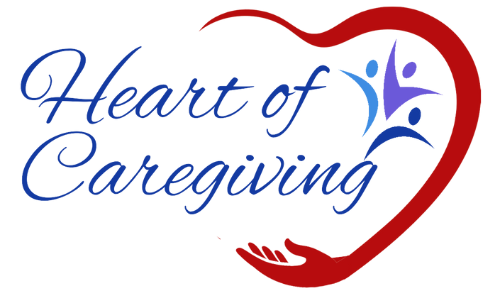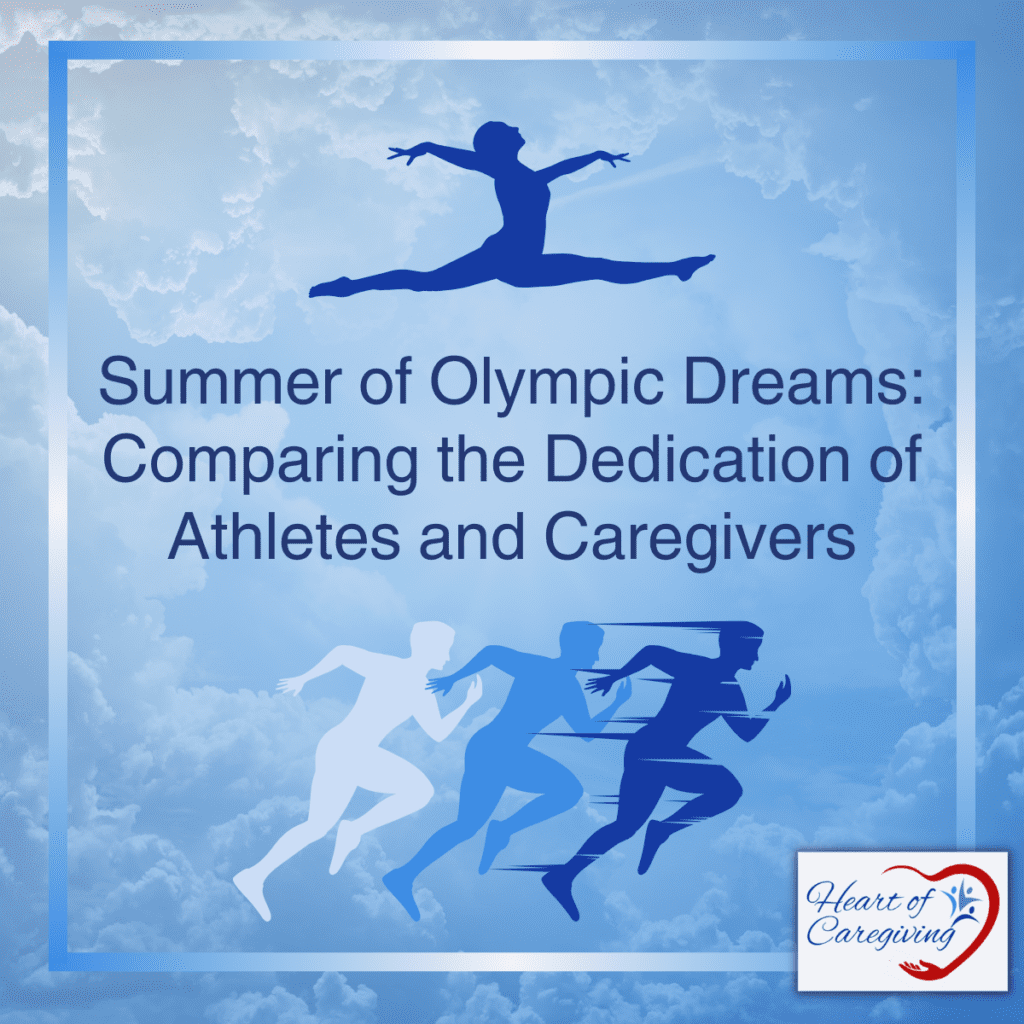Summer of Olympic Dreams: Comparing the Dedication of Athletes and Caregivers
I have been a fan of the Olympics since I was a kid, so let’s see—that’s seven decades! I was an Olympic gymnast hopeful in the 1960s, but it wasn’t meant to be. I recently watched the Olympic Gymnastic Trials and was mesmerized by how the difficulty in the routines has increased over time. As I reflected on my summer of Olympic dreams, I began thinking about the dedication of today’s athletes and how it compares to the dedication and commitment of caregivers.
What does the Olympics have to do with Caregiving?
Many of us are likely aware, to some extent, of the time, energy, money, and training that goes into becoming a world-class athlete. There is a time commitment and dedication to achieving peak performance, learning skills, and overcoming challenges. It could be breaking a record-setting time, as in track and field events. The Olympic athlete endures intense physical training, pushing their bodies to the limit and managing the emotional stress of competition and performance pressure. Life revolves around practice and travel to competitions. The reward is a medal or team trophy and recognition for the achievement.
In addition, athletes at this level often receive public recognition, accolades, and support from coaches, sponsors, and fans. This starkly contrasts the caregiver’s experience. Caregivers frequently work behind the scenes with little public recognition or formal support. Their efforts are often unacknowledged outside of their immediate circles.
Recognition, rules, and resources
While both athletes and caregivers demonstrate incredible dedication and resilience, their experiences differ in significant ways. Top-level athletes focus on personal achievement and performance within a structured training and competition environment, supported by clear rules, goals, and a range of resources such as coaches, medical staff, nutritionists, and state-of-the-art facilities.
In contrast, caregivers prioritize the well-being and health of another person, often setting aside their own needs and aspirations. They navigate an unpredictable environment with daily challenges and no precise end date, often with limited resources and support. Both roles require immense commitment, but the nature of their support systems and the structures they operate within are distinct.
Physically and emotionally demanding
As caregivers, we often provide care for extended periods, sometimes years or even decades, requiring consistent dedication and commitment. Caregivers frequently perform physically demanding tasks such as lifting, assisting with mobility, and managing daily care routines. The emotional toll of caregiving, including stress, anxiety, and emotional fatigue, is significant. Through experience, we learn about the time, energy, and money that goes into being an EFFECTIVE Caregiver.
There is no gold medal or excitement of having our photo on the cover of a Wheaties box at the end of the caregiving journey. And training? We don’t receive training and coaching to be a world-class caregiver? If we got any, it was when we were deep in the trenches of caregiving. And while an athlete may grieve a bad performance or the loss of a medal by hundreds of points, there is no preparation for grieving the loss of a loved one.
Resilience and adaptability
Olympic athletes show resilience by overcoming injuries, setbacks, and intense competition and adapting training methods and strategies to improve performance.
Caregivers demonstrate resilience by coping with the emotional and physical challenges of caregiving and adapting to the care recipient’s changing health conditions and needs.
Mental toughness and organization skills
Both Olympic athletes and caregivers need to develop significant mental toughness. Athletes face the pressure of competition and the possibility of failure, while caregivers must cope with emotional stress, the progression of diseases, and sometimes difficult caregiving situations.
Both athletes and caregivers must manage their time and organize their responsibilities effectively. Athletes juggle training schedules, competitions, and personal life. Caregivers balance caregiving duties with other personal and professional responsibilities. Both roles exemplify remarkable human strength and commitment and deserve to be celebrated.
Why I started Heart of Caregiving
When we compare and contrast the dedication and support of Olympic athletes and caregivers, it highlights need I saw and wanted to fill. This is why I started Heart of Caregiving. I had little help available when I cared for my mother for 14 years. I struggled to locate resources, felt alone and often without hope as I continued to provide care without support or recognition. I have been a consultant and educator for seven years now, and the learning continues. Also, I have had significant health issues for the past several years, and I have benefited from having a partner who is also a loving caregiver.
I learned so much by trial and error, with high anxiety, and made poor decisions about self-care and my health. I am still paying for some of those mistakes today. Through my caregiving experience and coaching family caregivers, I learned many strategies and techniques to navigate the journey more confidently. In addition to practical information, I learned to live life more fully, create happiness whenever possible, create a community of support and ask for help, and many other tips and strategies to reduce stress.
While I can’t award a medal to each if you deserving caregivers, I want to recognize your dedication and commitment. I want to support your summer of caregiving with practical, useful, and transformative tools. I have reduced the cost of these products and added more free information on my website.
4 ways to have less stress this summer:
1. Purchase 21 Mistakes Caregivers Make & How to Avoid Them on Amazon.com in ebook, paperback or hardcover.
2. Purchase the downloadable companion workbook on my website at a 50% discount.
3. Purchase the self-lead companion course on my website at an 80% discount.
4. Read my blog posts and check out the FREE tools and resources.
Free one-on-one consultations are also available. Please continue to read my newsletter and share it with friends and clients. In the coming months, more information, live Facebook interviews, virtual interviews, and presentations will be available. While this may not be your dream summer of caregiving, you can learn tips and strategies to make life easier and even experience more joy and happiness.
Learn more about the Super Summer Savings and transform your caregiving experience with these essential resources now available at a discount! For solutions for caregivers’ common mistakes, check out 21 Mistakes Caregivers Make & How to Avoid Them: Solutions and Strategies to Reduce Stress and Increase Happiness, available on Amazon! Are you looking for a dynamic speaker on caregiver empowerment? Go to my speaking page, and let’s connect!
The advice offered is for general information only; please consult your healthcare team, legal, or financial advisors for guidance.


